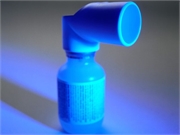- Could Your Grocery Store Meat Be Causing Recurring UTIs?
- Are You Making This Expensive Thermostat Error This Winter?
- Recognizing the Signs of Hypothyroidism
- 10 Strategies to Overcome Insomnia
- Could Artificial Sweeteners Be Aging the Brain Faster?
- Techniques for Soothing Your Nervous System
- Does the Water in Your House Smell Funny? Here’s Why
- Can a Daily Dose of Apple Cider Vinegar Actually Aid Weight Loss?
- 6 Health Beverages That Can Actually Spike Your Blood Sugar
- Treatment Options for Social Anxiety Disorder
Another Coronavirus Health Threat: Too Few Asthma Inhalers

As hospitals give more and more COVID-19 patients albuterol to help them breathe, people with asthma may have a hard time getting an inhaler.
The American College of Allergy, Asthma and Immunology (ACAAI) said some areas of the United States are experiencing shortages of albuterol inhalers, and the shortage may spread.
But Dr. Michael Blaiss, executive medical director of the ACAAI, emphasized that it is “nothing to panic about.”
Manufacturers are trying to keep up with the unexpected surge in demand, he said. Production issues are not to blame.
“No one should panic or hoard albuterol, though since you need a prescription, it’s not possible to hoard like toilet paper. But don’t put your albuterol asthma inhalers on autofill. If your asthma is under optimal control, an inhaler should last you more than a year,” Blaiss said.
And, if you can’t get an albuterol inhaler from your pharmacy, Blaiss said it’s important to know there are other options.
Patients with COVID-19 infections were initially treated with nebulizers, a common way to treat breathing problems in hospitals, and sometimes at home. But recent research suggested that when aerosolized, the coronavirus could hang in the air for a while, and some nebulizers might aerosolize the virus particles, Blaiss explained.
So, out of caution, many hospitals have switched to the use of albuterol inhalers. Albuterol is a medication that helps open up the airways. It is considered a “rescue” medication. There are also preventive medications, including different types of inhalers for asthma.
The big difference between a nebulizer and an inhaler is the dose received. Typically, someone given an inhaler is advised to take two puffs during an asthma symptom flare. “A nebulizer treatment is equivalent to about 10 puffs of an inhaler,” Blaiss said.
If you try to refill a prescription for an albuterol inhaler and can’t, Blaiss recommended contacting your physician. Meanwhile, keep taking your preventive asthma medications.
“You really want to make sure your asthma is under optimal control, making sure your lungs are functioning as well as possible,” he said.
Keeping your lungs as healthy as possible is critical right now, because people with asthma and other lung diseases are more likely to develop complications from a COVID-19 infection, according to the U.S. Centers for Disease Control and Prevention.
In a pinch, it’s usually OK to use an expired inhaler, Blaiss said. But doctors don’t know how far out from the expiration date an inhaler might work.
People also can use home nebulizers, and albuterol solution is available to use at home.
If you have been exposed to someone with COVID-19 or have any symptoms of infection — fever, cough, non-asthma-related shortness of breath — use your nebulizer in an isolated area, preferably outside, Blaiss recommended. If you must use it indoors, be sure no one else will be in that area for several hours at the least.
There are also inhalers that contain long-acting rescue medication that can ease wheezing and breathing difficulties.
Blaiss said anyone using an inhaler — rescue or preventive — should watch the counter on the device to be sure there is active medication in the canister.
Because the situation is still unfolding, Blaiss said he didn’t know how long any shortage might last.
Dr. Len Horovitz, a pulmonary specialist at Lenox Hill Hospital in New York City, said people may simply be filling their prescriptions more regularly to ensure they have a supply in place.
“Since albuterol is a rescue medicine, not necessarily a daily maintenance medicine, the shortage of supply will hopefully be temporary,” Horovitz said.
More information
Learn more about asthma medications from the American Lung Association.
Source: HealthDay
Copyright © 2026 HealthDay. All rights reserved.










